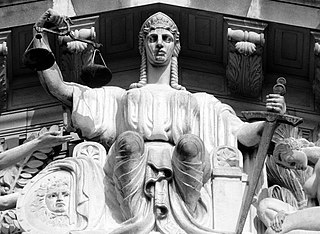Pith and substance is a legal doctrine in Canadian constitutional interpretation used to determine under which head of power a given piece of legislation falls. The doctrine is primarily used when a law is challenged on the basis that one level of government has encroached upon the exclusive jurisdiction of another level of government.

Ultra vires is a Latin phrase used in law to describe an act that requires legal authority but is done without it. Its opposite, an act done under proper authority, is intra vires. Acts that are intra vires may equivalently be termed "valid", and those that are ultra vires termed "invalid".
Canadian constitutional law is the area of Canadian law relating to the interpretation and application of the Constitution of Canada by the courts. All laws of Canada, both provincial and federal, must conform to the Constitution and any laws inconsistent with the Constitution have no force or effect.

Amax Potash Ltd v Saskatchewan [1977] 2 S.C.R. 576 is a leading case of the Supreme Court of Canada on the application and role of the Constitution of Canada.

Salomon v A Salomon & Co Ltd[1896] UKHL 1, [1897] AC 22 is a landmark UK company law case. The effect of the House of Lords' unanimous ruling was to uphold firmly the doctrine of corporate personality, as set out in the Companies Act 1862, so that creditors of an insolvent company could not sue the company's shareholders for payment of outstanding debts.

Multiple Access Ltd v McCutcheon is a leading constitutional decision of the Supreme Court of Canada on the resolution of overlapping federal and provincial laws under the doctrine of double aspect.

English contract law is the body of law that regulates legally binding agreements in England and Wales. With its roots in the lex mercatoria and the activism of the judiciary during the industrial revolution, it shares a heritage with countries across the Commonwealth, from membership in the European Union, continuing membership in Unidroit, and to a lesser extent the United States. Any agreement that is enforceable in court is a contract. A contract is a voluntary obligation, contrasting to the duty to not violate others rights in tort or unjust enrichment. English law places a high value on ensuring people have truly consented to the deals that bind them in court, so long as they comply with statutory and human rights.

United Kingdom administrative law is part of UK constitutional law that is designed through judicial review to hold executive power and public bodies accountable under the law. A person can apply to the High Court to challenge a public body's decision if they have a "sufficient interest", within three months of the grounds of the cause of action becoming known. By contrast, claims against public bodies in tort or contract are usually limited by the Limitation Act 1980 to a period of 6 years.

Ashbury Railway Carriage and Iron Co Ltd v Riche (1875) LR 7 HL 653 is a UK company law case, which concerned the objects clause of a company's memorandum of association.

Capacity in English law refers to the ability of a contracting party to enter into legally binding relations. If a party does not have the capacity to do so, then subsequent contracts may be invalid; however, in the interests of certainty, there is a prima facie presumption that both parties hold the capacity to contract. Those who contract without a full knowledge of the relevant subject matter, or those who are illiterate or unfamiliar with the English language, will not often be released from their bargains.
An objects clause is a provision in a company's constitution stating the purpose and range of activities for which the company is carried on. In UK company law, until reforms enacted in the Companies Act 1989 and the Companies Act 2006, an objects clause circumscribed the capacity, or power, of a company to act. To avoid problems, long and unwieldy 'catch-all' objects clauses were often drafted to include as much potential activity as possible, and thus avoid dealings being found to be ultra vires: the legal position was that any contract entered into beyond the power, or ultra vires, would be deemed void ab initio.

Isle of Wight Railway Company v Tahourdin (1884) LR 25 Ch D 320 is a UK company law case on removing directors under the old Companies Clauses Act 1845. In the modern Companies Act 2006, section 168 allows shareholders to remove of directors by a majority vote on reasonable notice, regardless of what the company constitution says. Before 1945, removal of directors depended on the constitution, however this case contains some useful guidance on how to properly construe the provisions of a constitution.

Rolled Steel Products (Holdings) Ltd v British Steel Corp [1986] Ch 246 is a UK company law case, concerning the enforceability of obligations against a company. The case was one of the last significant cases on ultra vires under English company law before the provisions abrogating that doctrine in the Companies Act 1985 became effective.

Illegality is one of the three broad headings of judicial review of administrative action in Singapore, the others being irrationality and procedural impropriety. To avoid acting illegally, an administrative body or public authority must correctly understand the law regulating its power to act and to make decisions, and give effect to it.

Progress Property Co Ltd v Moorgarth Group Ltd[2010] UKSC 55 is a UK company law case concerning the circumstances by which a transaction at an undervalue would be considered an unauthorised return of capital.
Attribution of liability to United Kingdom companies involves the rules of contract, agency, capacity, tort and crime as they relate to UK company law. They establish under what circumstances a company may be sued for the actions of its directors, employees and other agents.

Sinclair v Brougham [1914] AC 398 is an English trusts law case, concerning the right of depositors to recover sums which were deposited to a building society under contracts of deposit which were beyond the powers of the building society.

An ouster clause or privative clause is, in countries with common law legal systems, a clause or provision included in a piece of legislation by a legislative body to exclude judicial review of acts and decisions of the executive by stripping the courts of their supervisory judicial function. According to the doctrine of the separation of powers, one of the important functions of the judiciary is to keep the executive in check by ensuring that its acts comply with the law, including, where applicable, the constitution. Ouster clauses prevent courts from carrying out this function, but may be justified on the ground that they preserve the powers of the executive and promote the finality of its acts and decisions.

Credit Suisse International v Stichting Vestia Groep[2014] EWHC 3103 (Comm) was a decision of the High Court of Justice relating to the doctrine of ultra vires and the effect of contractual representations made under an ISDA Master Agreement on the doctrine.

British South Africa Company v De Beers Consolidated Mines Ltd [1910] 2 Ch 502 is a judicial decision of the English Court of Appeal relating to the conflict of laws, and clogs upon the equity of redemption.













